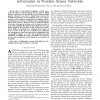Free Online Productivity Tools
i2Speak
i2Symbol
i2OCR
iTex2Img
iWeb2Print
iWeb2Shot
i2Type
iPdf2Split
iPdf2Merge
i2Bopomofo
i2Arabic
i2Style
i2Image
i2PDF
iLatex2Rtf
Sci2ools
105
click to vote
JSAC
2010
2010
A randomized countermeasure against parasitic adversaries in wireless sensor networks
—Due to their limited capabilities, wireless sensor nodes are subject to physical attacks that are hard to defend against. In this paper, we first identify a typical attacker, called parasitic adversary, who seeks to exploit sensor networks by obtaining measurements in an unauthorized way. As a countermeasure, we first employ a randomized key refreshing: with low communication cost, it aims at confining (but not eliminating) the effects of the adversary. Moreover, our low-complexity solution, GossiCrypt, leverages on the large scale of sensor networks to protect data confidentiality, efficiently and effectively. GossiCrypt applies symmetric key encryption to data at their source nodes; and it applies re-encryption at a randomly chosen subset of nodes en route to the sink. The combination of randomized key refreshing and GossiCrypt protects data confidentiality with a probability of almost 1; we show this analytically and with simulations. In addition, the energy consumption of ...
| Added | 29 Jan 2011 |
| Updated | 29 Jan 2011 |
| Type | Journal |
| Year | 2010 |
| Where | JSAC |
| Authors | Panagiotis Papadimitratos, Jun Luo, Jean-Pierre Hubaux |
Comments (0)

